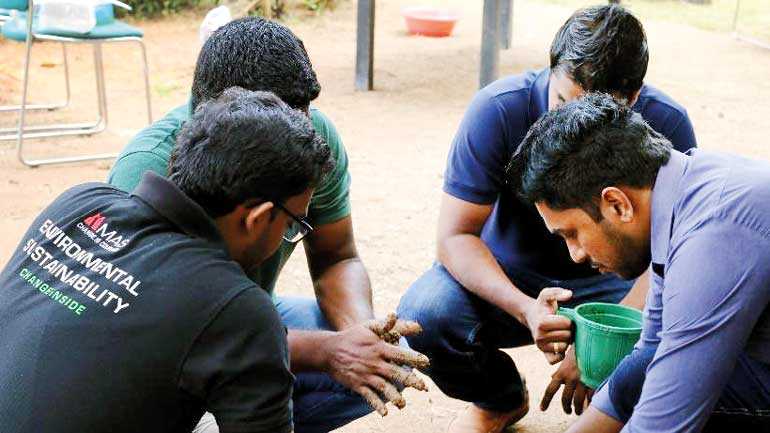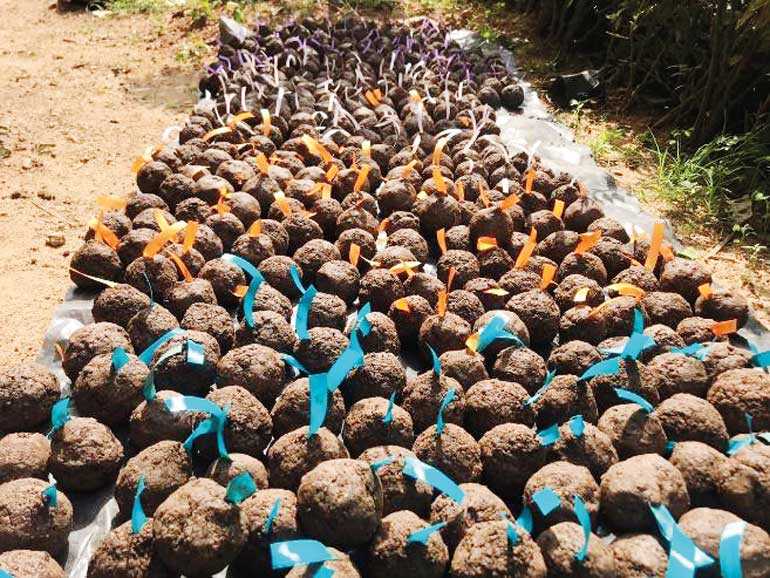Friday Feb 27, 2026
Friday Feb 27, 2026
Monday, 24 December 2018 00:32 - - {{hitsCtrl.values.hits}}


MAS Holdings recently announced that it has launched Sri Lanka’s first ever Aerial Reforestation Project in collaboration with Sri Lanka Air Force.
Since June 2018, MAS has experimented on a new tool to curb deforestation, by conserving the country’s rapidly dwindling forest cover and growing its future forests. Seeds balls have been used since ancient times as a technique for propagating plants without ploughing the earth with tools. Philosopher Masanobu Fukuoka and organic farmers in Japan spearheaded the rediscovery and popularisation of seed balls in the contemporary world.
MAS Holdings integrated the seed-balling project into its Sustainability Action Plan in June 2018, with the expertise of the University of Peradeniya. Prof.D.K.N.G. Pushpakumara, the Dean of the Agriculture faculty at Peradeniya University and his teams have been carrying out years of research into the aerial reforestation method, which drops hundreds of seeds wrapped in clay or soil balls across a designated area to encourage the growth of new saplings and vegetation.
“This was a delicate task – there was a lot to consider, measure and create. First, we reached out to the Forest Conservation Department, and was given a five-acre plot in Nochchiyagama, Anuradhapura. It was a degraded plot of land that had lost the entire forest cover. Our challenge was to create these seed bombs which required a combination of the right forest trees to fit the climate zone, the right clay, soil and compost combination to suit the chosen seeds,” MAS Holdings Director of Environmental Sustainability Sharika Senanayake said.
The Air Force, under the leadership of the Commander of the Air Force, has been actively involved in a number of efforts to restore the forest cover of Sri Lanka.Our involvement in the pioneering Seed Bombing Project is a continuation and reaffirmation of our commitment to this endeavour. As we are entrusted with the protection of national security through judicious use of Air Power, we are happy to be able to bring that Air Power to bear in a timely and essential enterprise, in order to do our part to ensure a truly green environment for our future generations - Group Captain Gihan Seneviratne, Sri Lanka Air Force Media Spokesman
MAS approached Sri Lanka Air Force, who have been proactively researching on the techniques of incorporating seed bombing for reforestation, where they immediately agreed to partner with MAS and provide essential aerial assistance for the project.
Expressing his views on the project, Group Captain GihanSeneviratne, Sri Lanka Air Force Media Spokesman noted, “The Air Force, under the leadership of the Commander of the Air Force, has been actively involved in a number of efforts to restore the forest cover of Sri Lanka.Our involvement in the pioneering Seed Bombing Project is a continuation and reaffirmation of our commitment to this endeavour. As we are entrusted with the protection of national security through judicious use of Air Power, we are happy to be able to bring that Air Power to bear in a timely and essential enterprise, in order to do our part to ensure a truly green environment for our future generations.”
Inside the plant nursery of the MAS Fabric Park in ThulhiriyaMAS conducted trial runs on the seed ball composition with a limited amount of seed bombs where germination and growth rate were studied in-house.Together with the Air Force, the teams also carried out drop tests on a limited amount of seed balls from designated heights.
“This was a delicate task – there was a lot to consider, measure and create. First, we reached out to the Forest Conservation Department, and was given a five-acre plot in Nochchiyagama, Anuradhapura. It was a degraded plot of land that had lost the entire forest cover. Our challenge was to create these seed bombs which required a combination of the right forest trees to fit the climate zone, the right clay, soil and compost combination to suit the chosen seeds - MAS Holdings Director of Environmental Sustainability Sharika Senanayake
MAS picked three types of seeds:Kumbuk (Terminaliaarjuna), Karanda (Pongamiapinnata) and Mee (Madhucalongifolia) for the pilot drop.
“By November, the teams finalised the research methodology which included determining the different compositions of the seed balls, tagging system, sampling system and monitoring schedule. The allocated land in Nochchiyagama was inspected, prepared and demarcated to ensure follow up observations can be conducted at the site. Wednesday was a landmark day for us all to be able to finally let these colourful bombs free fall and settle in their new home. Now we wait and monitor their germination,” Senanayake added. Sri Lanka is losing over 8,000 hectares of forest cover each year. Our future forests will depend on powerful partnerships that bring creative reforestation ideas to life. This is a project we are ready to document in detail and share with the rest of the world. If you would like to be a part of this timely cause, contact the key stakeholders of this project via:
MAS Holdings – [email protected].